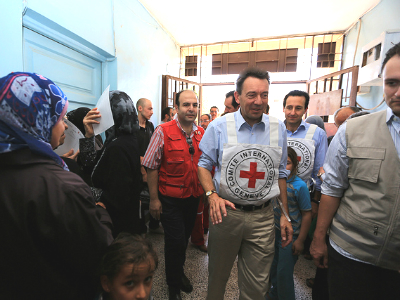
The Importance of Neutrality in Times of Conflict |
|
Monday, 6 November 2017 Neutrality can be essential to the operations of a Nongovernmental Organization (NGO), especially when that NGO is servicing people in an armed conflict. This post defines neutrality, shows how to be neutral, as well as the benefits of being neutral, while looking at a case study of the International Committee of the Red Cross. It also explores some of the criticisms of being neutral. Here’s how the New Oxford American Dictionary defines neutrality: 1 The state of not supporting or helping either side in a conflict, disagreement, etc.; impartiality: during the war, Switzerland maintained its neutrality; So to be neutral means not to take sides, especially when in a conflict, and not to express views or feelings. For NGOs in conflict zones this translates into providing services to anyone in need, not expressing anything that would show they lean towards a side in a conflict, and not aligning with the military or a government if that applies. In addition, an NGO must also stay aware of how they portray themselves to the public. The International Committee of the Red Cross (ICRC) is a good example of how an NGO can stay neutral. Mandated by the Geneva Convention in 1949, the ICRC works to protect and assist victims of armed conflicts and other situations of violence. For the ICRC, neutrality is one of their main principles to achieve the goal of helping as many people as their can. The staff often finds themselves in conflict and their neutrality not only protects them but the people they are helping. This neutrality also helps them to gain access to areas and populations affected by violent situations. And they are mandated to help everyone, regardless of their race, religion, sex, age, or ideas. They do this through being consistent in their actions, being transparent, which gains the trust of all sides in the conflict, by staying silent, and by being aware of their image. Although neutrality works well for the ICRC, it may not work for other NGOs. In fact, there are many criticisms against an NGO being neutral. These include: 1. Neutrality is naïve in that every action of an NGO has a political meaning and impact; 2. Neutrality is a smokescreen, which is similar to the first but goes further to say that every NGO leans toward a sign; 3. Neutrality is passivity, which means taking the stand of neutrality ultimately means failing to take a stand against the injustices in our society. 4. Neutrality and guilt, which criticizes the notion of impartiality, specifically when it comes to helping those who are a part of the conflict over those who are victims of the conflict. In light of these positions, when is it acceptable to be neutral? Is neutrality necessary during times of peace or in locations where there isn’t any conflict? Does the ICRC consistently achieve neutrality? Is neutrality only effective with the ICRC? Should other NGOs follow suit after ICRC? Does ICRC’s status play a role into why neutrality is necessary? It is clear that deconstructing the meaning of neutrality, as well as considering the positives and negatives of it, is an important notion to contemplate when managing a NGO. Resources:https://phap.org/articles/being-neutral-reflections-neutrality-humanitarian-action https://en.oxforddictionaries.com/definition/us/neutrality https://www.icrc.org/en/event/principles-action-how-do-neutrality-and-independence-contribute-humanitarian-effectiveness https://www.icrc.org/en/mandate-and-mission http://odihpn.org/magazine/does-it-still-make-sense-to-be-neutral/ Photo: ICRC / Ibrahim Malla / www.icrc.org |

 By Taylor Kelly
By Taylor Kelly